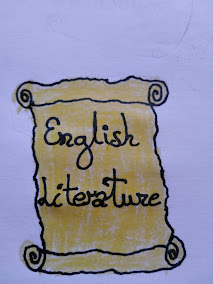On todays post I am showing some ideas about how to include English Literature into secondary school classes with activities based on differents arts. I'm dividing this post into two parts as so you can follow it better. In this first post I'm talking about how to work a little bit of history of English Literature and some characteristica of its poetry.
A little bit of history of the English literature and how to work it in subjects as English and Social Sciences and Culture and ethical values.
English literature has sometimes been stigmatized as insular. English literature of the subjugated Saxons was leavened by Latin and Anglo-Norman writings, eminently foreign in origin, in which the churchmen and the Norman conquerors expressed themselves. During the Renaissance the renewed interest in Classical learning and values had an important effect on English literature. The Decadents of the late 19th century and the Modernists of the early 20th looked to continental European individuals and movements for inspiration. Additional influence was exercised by deconstructionist analysis, based largely on the work of French philosopher Jaques Derrida.
Some contents that can be worked related to the history of English Literature are; on one hand in English area: writen comprehension in English language and the majority variants of the English language. On the other hand, related with the area of Social Sciences: cartography and culture and art in the sixteenth and seventeenth centuries, Humanism, Renaissance and Baroque. And finally, in the area of Culture and ethical values: the concept of freedom and its limits; and cultural, political and religious plurality.
As well, some activities which can be done are: a mural of the English literature history, the analyses of some texts of Humanism,Renaissance and Baroque, or a theatre play about English literature history.
English poetry and how to work it in subjects as Social sciences and English.
The Angles, Saxons, and Jutes who invaded Britain in the 5th and 6th centuries brought with them the common Germanic metre; but of their earliest oral poetry, probably used for panegyric, magic, and short narrative, little or none survives. Virtually all Old English poetry is written in a single metre, a four-stress line with a syntactical break, or caesura, between the second and third stresses, and with alliteration linking the two halves of the line; this pattern is occasionally varied by six-stress lines.
The poetry is formulaic, drawing on a common set of stock phrases and phrase patterns, applying standard epithets to various classes of characters, and depicting scenery with such recurring images as the eagle and the wolf, which wait during battles to feast on carrion, and ice and snow, which appear in the landscape to signal sorrow. Most Old English poetry is preserved in four manuscripts of the late 10th and early 11th centuries. The Beowulf manuscript contains Beowulf, Judith, and three prose tracts; the Exeter Book is a miscellaneous gathering of lyrics, riddles, didactic poems, and religious narratives; the Junius Manuscript contains biblical paraphrases; and the Vercelli Book contains saints' lives, several short religious poems, and prose homilies.
Some contents that can be worked related to the English Poetry are; on one hand in Social Sciences area: the stages and chronology of the Middle Ages, the medieval imaginary, Christianity, the Germanic kingdoms and the Byzantine Empire. On the other hand, related with the area of English, we can work : audition of traditional rhymes, poems and songs, reading of traditional rhymes, poems and songs, audition and reading of contemporary short poems, writing poems.
As well, some activities which can be done are: interpreting one poem as it was theater monologue, audition a poetry recital, astudy Middle Ages through poetry, study the Middle Ages through poetry ans study the Germanic kingdoms and the Byzantine Empire through poetry.
Web pages and documents consulted online:
- English Literature. Britannica: https://www.britannica.com/art/English-literature.
- Curriculum educació secundaria obligatòria. Àmbit lingüístic: http://xtec.gencat.cat/web/.content/curriculum/eso/curriculum2015/documents/ANNEX-3-Ambit-lingueistic.pdf.
- Curriculum educació secundaria obligatòria. Àmbit social: http://xtec.gencat.cat/web/.content/curriculum/eso/curriculum2015/documents/ANNEX-6-Ambit-social.pdf.





No hay comentarios:
Publicar un comentario